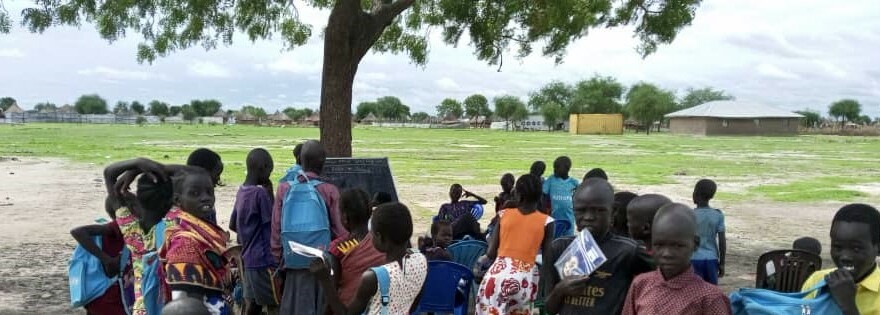Schoolchildren in Uror County of Jonglei State are facing significant challenges in obtaining a quality education due to a shortage of scholastic materials and an inadequate learning environment.
Speaking to Radio Tamazuj in Yuai town on Monday, several schoolchildren talked about difficulties facing them, saying most of them receive lessons under trees with insufficient textbooks and stationery.
Nyabang Mayen, one of the students, acknowledged the challenging situation and appealed for assistance on behalf of her fellow schoolmates.
“One of the main problems we face is the lack of classrooms for pupils. Lower primary students are forced to study under trees, and when it rains, they are often sent home,” Nyabang said. “Additionally, we don’t have school uniforms, textbooks for our subjects, and even sanitary pads for girls,” she revealed.
According to the South Sudan Transitional Constitution, Article 29 (1) states, “Education is a right for every citizen, and all levels of government must provide access to education without discrimination based on religion, race, ethnicity, health status, including HIV/AIDS, gender, or disability.”
Kuol Manyiel, another student, expressed the feeling of neglect among the students and pleaded with senior government officials at the state and national levels to address their concerns. “We lack school uniforms, food during school hours, and our school lacks safe drinking water. Furthermore, we have a shortage of essential school materials like pens, notebooks, and textbooks. We hope that our government can understand the extent of our suffering and provide assistance,” Kuol emphasized.
The past five years of civil war in the country have resulted in the closure and destruction of schools in Uror. Most primary and secondary schools in the county only reopened in 2018 following the signing of the Revitalized Agreement on the Resolution of the Conflict in South Sudan (R-ARCISS) that ended the war.
Mun Jool, the principal of Yuai Primary School, highlighted that the challenging learning environment not only affects the students but also the teachers. Since 2018, teachers have struggled to keep the students engaged in their studies.
Mun explained, “Despite the challenges, we cannot abandon teaching. As teachers, we lack necessary educational materials such as registration books, chalk, and blackboards. Since the beginning of the academic year last month, we have been facing numerous difficulties.”
Mun added, “With the assistance of some aid organizations, we have been able to construct temporary learning spaces. Unfortunately, these spaces are insufficient, and when it rains, classes are interrupted as we gather the students into one room or send them home.”
Hoaw Gatkuoth Thou, the county Education director, acknowledged the overwhelming challenges faced by the education sector in Uror. He stated that efforts were being made to engage aid agencies to address some of the difficulties.
However, he explained that the Uror county government lacks the resources to adequately respond to the education sector’s challenges. Hoaw elaborated, “Learning materials like pens and exercise books are a challenge for our students.
“In March, we received 52 cartons of exercise books, which are not sufficient for the 73 primary schools with a population of 29,000 students and three secondary schools with a population of 2,200,” Gatkuoth added.
He further mentioned, “Other challenges include a lack of learning space. We currently have 257 teachers on government payrolls and an additional 339 who are volunteers.”
The South Sudan Transitional Constitution states, “All levels of government shall promote education at all levels and ensure free and compulsory education at the primary level. They shall also provide free illiteracy eradication programs.” However, Uror is still waiting for county administrators, state officials, and the national government to implement these provisions of the constitution.
Simon Manyok Deng, an advisor on human rights affairs in the Jonglei State government, stressed that the situation in Uror and other counties in the state amounts to a violation of the right to education. He urged teachers to persevere and fulfil their commitment to educating the children.
Advisor Manyok, an experienced teacher with 15 years of experience, called for government intervention to salvage the education system, warning that the educational prospects of a generation of schoolchildren are at stake.
“Our students in the county are not receiving the same quality education as those in the state capital. When national exams approach, they may pass, but their knowledge will be lacking. This success will be of no benefit. As an experienced teacher, such a situation will create an educational gap, which is dangerous for our country. Education is a primary responsibility of the government. The government should intervene, and our development partners will follow suit,” Manyok pleaded.




